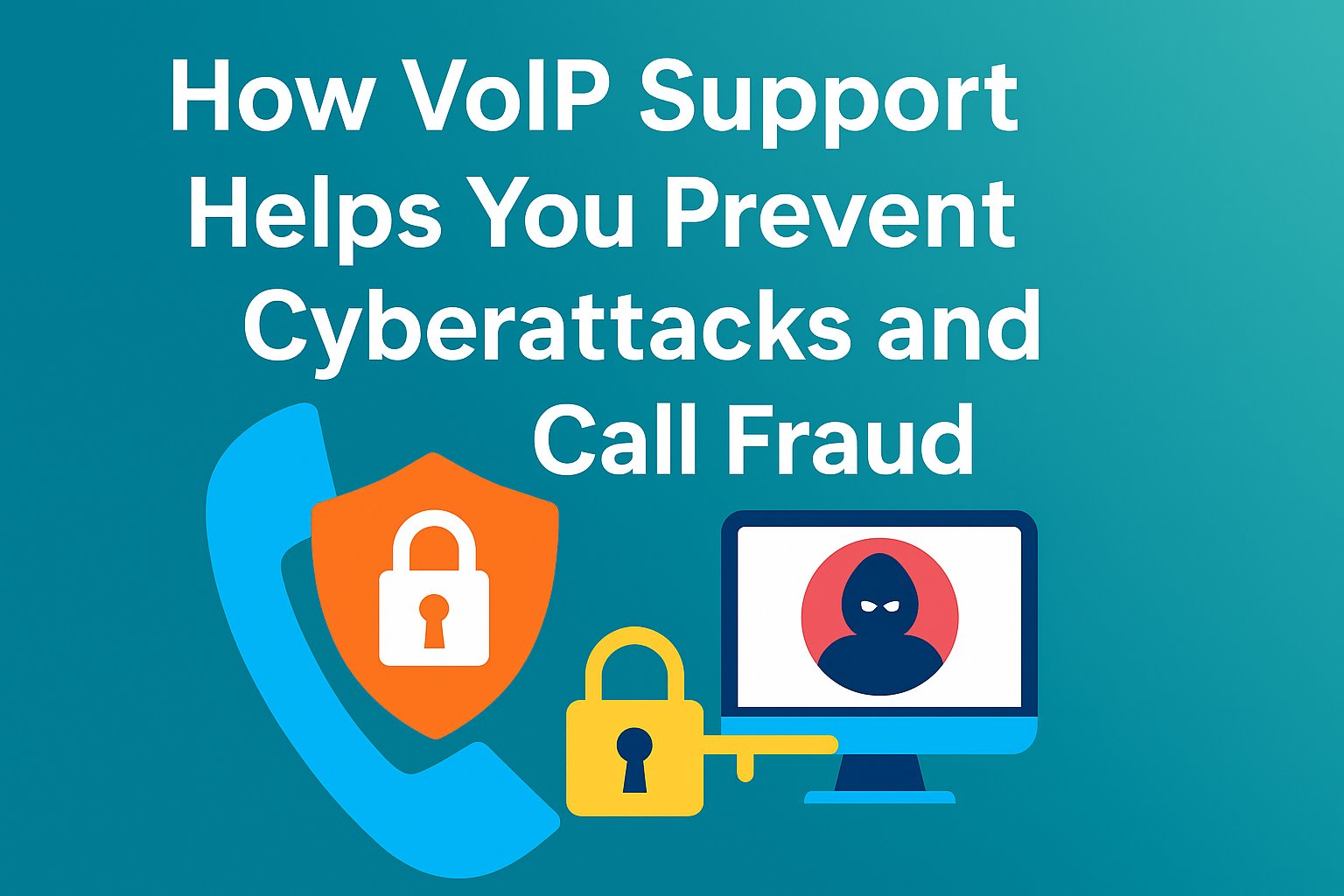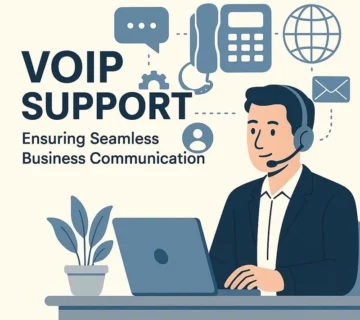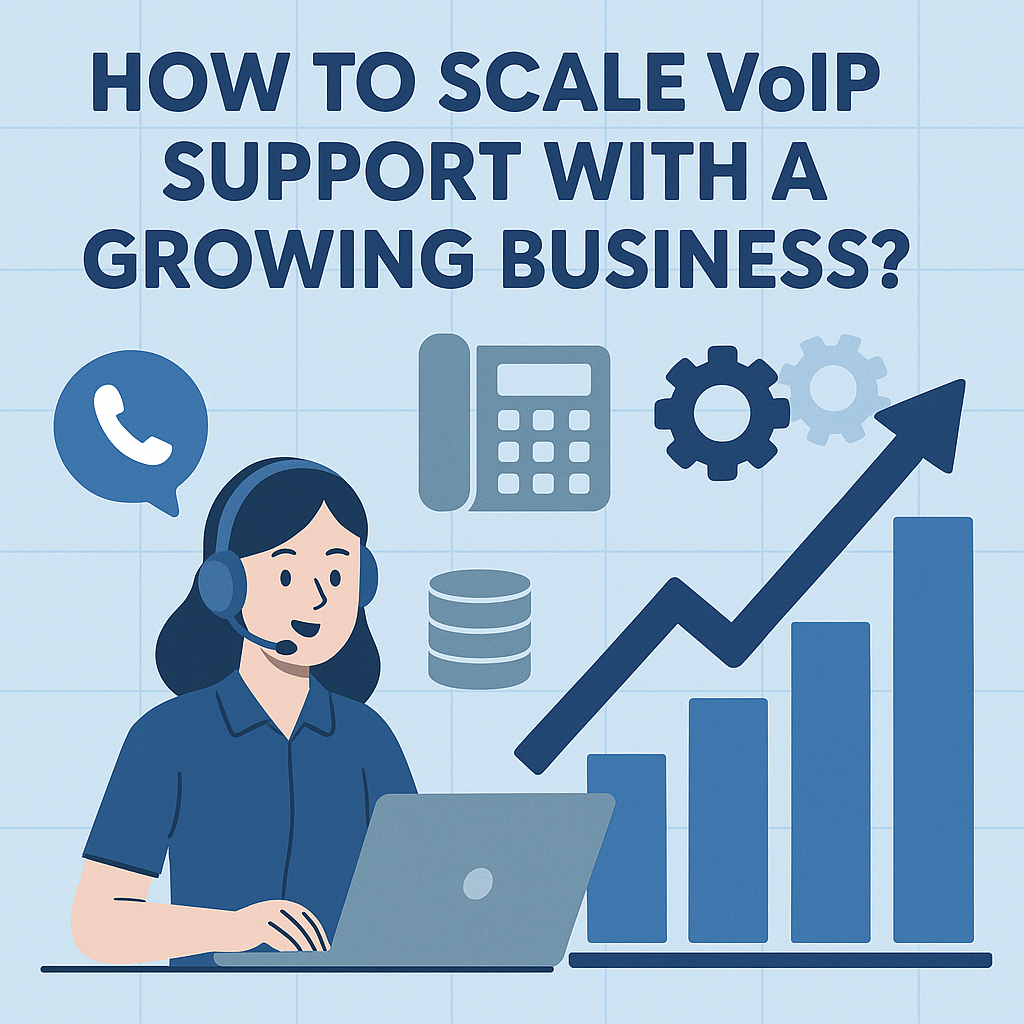How VoIP Support Helps You Prevent Cyberattacks and Call Fraud

Voice over Internet Protocol (VoIP) systems have transformed business communications by offering cost-effective solutions and enhanced flexibility. As organizations search for the top business voip provider and advanced business voip solutions, this digital transformation brings significant security challenges. Comprehensive voip security solutions are essential to address cyberattacks and call fraud effectively. The best business voip solution must balance functionality with robust security measures.
What Makes VoIP Systems Vulnerable to Security Threats
Top business voip solutions face unique security risks due to their internet-based nature. Unlike traditional phone systems that operate on dedicated lines, VoIP communications travel through networks that cybercriminals can potentially exploit. Understanding these voip security risks is crucial for businesses implementing advanced voip solutions.
The internet-based nature of VoIP creates multiple entry points for cybercriminals. These systems rely on network infrastructure that may have vulnerabilities, making comprehensive security measures essential for protecting business communications.
The Most Common VoIP Security Threats Businesses Face
These common voip security threats represent some of the top business challenges solved by voip systems when proper security measures are implemented:
Call Fraud and Toll Fraud
Unauthorized users gain access to VoIP systems to make expensive international calls, resulting in substantial financial losses for businesses. This type of fraud costs companies billions annually worldwide and represents one of the most significant voip security issues facing organizations today.
Toll fraud typically occurs when attackers exploit weak authentication systems or unsecured endpoints. They then use the compromised system to make high-cost calls to premium-rate numbers or international destinations.
Eavesdropping and Call Interception
Cybercriminals can intercept VoIP calls to steal sensitive information, including customer data, financial details, and confidential business discussions. This threat is particularly concerning for voip for remote workers who may use less secure networks.
Unencrypted VoIP communications are especially vulnerable to interception. Attackers can use packet-sniffing tools to capture voice data as it travels across networks.
Denial of Service (DoS) Attacks
Attackers flood VoIP systems with excessive traffic, causing service disruptions and preventing legitimate communications from occurring. This can severely impact business voip features and overall productivity.
These attacks can target various components of the VoIP infrastructure, including servers, gateways, and network equipment, making comprehensive protection necessary.
Identity Spoofing and Caller ID Manipulation
Fraudsters manipulate caller ID information to impersonate trusted contacts, facilitating social engineering attacks and unauthorized access to sensitive systems.
This type of attack is particularly dangerous because it exploits human trust, making it difficult for recipients to identify malicious calls.
How Professional VoIP Support Prevents Security Breaches
Professional VoIP support teams implement multi-layered security strategies that protect against various attack vectors. These comprehensive approaches address both technical vulnerabilities and human factors that contribute to security risks.
Network Security Implementation Strategies
Professional VoIP support teams implement robust network security measures that protect against various attack vectors. When working with small business voip providers, these specialists configure firewalls specifically designed for VoIP traffic, ensuring that only authorized communications reach your system. This approach addresses many voip security issues before they can impact operations.
Security experts establish virtual private networks (VPNs) for VoIP traffic, creating encrypted tunnels that protect voice data from interception. This approach significantly reduces the risk of eavesdropping and maintains communication privacy, particularly important for voip for remote workers who access company systems from various locations.
Firewall Configuration for VoIP Traffic
Specialized VoIP firewalls analyze voice traffic patterns and block suspicious communications before they reach your system. These firewalls understand VoIP protocols and can identify anomalies that traditional firewalls might miss.
Network Segmentation and Traffic Isolation
Professional support teams create separate network segments for VoIP traffic, isolating voice communications from other data traffic. This segmentation limits the potential impact of security breaches and improves overall system performance.
Authentication and Access Control Systems
VoIP support professionals implement multi-factor authentication systems that verify user identities before granting system access. This prevents unauthorized users from gaining entry to your communication infrastructure and is essential for advanced business voip solutions.
Advanced access control measures include user privilege management, ensuring that employees only access features necessary for their roles. This principle of least privilege minimizes potential damage from compromised accounts and enhances overall voip security solutions.
Multi-Factor Authentication Implementation
Modern authentication systems require multiple forms of verification, including passwords, biometric data, and hardware tokens. This layered approach significantly reduces the risk of unauthorized access.
Role-Based Access Control
Different users receive access to specific features based on their job responsibilities. Executives might have international calling privileges, while entry-level employees may be restricted to domestic calls.
Real-Time Monitoring and Threat Detection
Professional support teams deploy sophisticated monitoring systems that track VoIP traffic patterns and identify suspicious activities. These systems can detect unusual call volumes, unauthorized access attempts, and potential fraud indicators, making them crucial components of comprehensive voip security solutions.
Automated alert systems notify administrators immediately when security threats are detected, enabling rapid response to prevent significant damage or financial losses. This proactive approach helps organizations maintain the reliability expected from a top business voip provider.
Behavioral Analysis and Pattern Recognition
Advanced monitoring systems learn normal usage patterns for each user and can quickly identify deviations that might indicate compromise or fraud.
Automated Response Systems
When threats are detected, automated systems can immediately implement protective measures, such as blocking suspicious calls or disabling compromised accounts.
Essential VoIP Features for Small Businesses in 2025
Modern voip features for small businesses 2025 include enhanced security measures alongside traditional communication capabilities. These features address common voip security threats while providing the functionality small businesses need to compete effectively.
Advanced Security Features
Next-Generation Encryption Standards
Next-generation encryption protocols protect voice data with military-grade security, ensuring confidential business communications remain private. These protocols use advanced algorithms that are virtually impossible to crack with current technology.
AI-Powered Threat Detection Systems
Machine learning algorithms analyze call patterns to identify potential security threats in real-time, providing proactive protection against emerging risks. These systems continuously learn and adapt to new threat patterns.
Integrated Security Management Dashboards
Centralized security management interfaces allow small business owners to monitor their VoIP security status and configure protection settings without technical expertise. These dashboards provide clear, actionable information about system security.
Enhanced Mobile Security Extensions
Enhanced security features for mobile VoIP applications ensure that voip for remote workers maintains the same level of protection as office-based communications. This includes secure mobile apps and encrypted mobile-to-desktop connections.
Communication Enhancement Features
Cloud-Based Scalability
Modern VoIP systems can instantly scale up or down based on business needs, providing flexibility that traditional phone systems cannot match.
Integration with Business Applications
Advanced systems integrate with customer relationship management (CRM) software, email platforms, and other business tools to streamline operations.
Comprehensive Call Fraud Prevention Strategies
Effective call fraud prevention requires multiple layers of protection working together to identify and block unauthorized usage before it results in financial losses.
Geographic Controls and Intelligent Call Routing
VoIP support specialists implement geographic restrictions that prevent calls to high-risk international destinations. These controls can be customized based on your business needs while maintaining necessary international communication capabilities. This feature is particularly valuable for small business voip providers serving clients with specific geographic requirements.
Smart call routing systems analyze call patterns and automatically block suspicious calls that match known fraud indicators, protecting your organization from toll fraud. These advanced voip solutions help prevent the financial losses associated with common voip security threats.
Customizable Geographic Restrictions
Businesses can create specific rules about which countries or regions their employees can call, with exceptions for authorized users or specific business needs.
Time-Based Calling Restrictions
Systems can automatically block international calls during non-business hours or require additional authorization for after-hours calling.
Advanced Usage Monitoring and Anomaly Detection
Advanced monitoring systems track individual user calling patterns, establishing baselines for normal usage. When calls deviate significantly from established patterns, the system generates alerts for investigation. This capability is essential for maintaining the security standards expected from a top business voip solution.
Time-based restrictions prevent calls during non-business hours unless specifically authorized, reducing the risk of after-hours fraud attempts. These business voip features provide additional layers of protection against unauthorized usage.
Individual User Profiling
The system creates unique usage profiles for each user, tracking their typical calling patterns, destinations, and timing preferences.
Threshold-Based Alerting
Administrators can set specific thresholds for calling volume, duration, or cost that trigger automatic alerts when exceeded.
Technical Security Measures for VoIP Protection
Technical security measures form the foundation of effective VoIP protection, providing the underlying infrastructure necessary to prevent attacks and maintain system integrity.
Encryption and Secure Communication Protocols
Professional VoIP support ensures that all voice communications use secure protocols like Secure Real-time Transport Protocol (SRTP) and Transport Layer Security (TLS). These encryption methods protect voice data during transmission and are fundamental components of advanced business voip solutions.
Session border controllers (SBCs) act as security gateways, filtering malicious traffic and preventing unauthorized access to VoIP infrastructure. These devices are critical for addressing voip security risks in enterprise environments.
Protocol Security Implementation
Different protocols serve specific security functions, with SRTP protecting voice streams and TLS securing signaling traffic between devices.
Session Border Controller Benefits
SBCs provide multiple security functions, including traffic filtering, protocol translation, and network topology hiding from potential attackers.
Ongoing Security Updates and Patch Management
VoIP support teams maintain current security patches for all system components, addressing newly discovered vulnerabilities before they can be exploited by cybercriminals. This proactive approach is essential for maintaining the security standards expected from the best business voip solution.
Firmware updates for VoIP devices are managed centrally, ensuring consistent security across all endpoints without disrupting business operations. This systematic approach helps organizations avoid the voip security issues that can arise from outdated software.
Centralized Update Management
Professional support teams coordinate updates across all system components to ensure compatibility and minimize downtime.
Vulnerability Assessment and Response
Regular security assessments identify potential weaknesses before they can be exploited by attackers.
Key Benefits of Professional VoIP Security Support
Professional VoIP security support provides multiple benefits that extend beyond basic protection, delivering value through cost savings, compliance, and operational reliability.
Financial Protection Through Fraud Prevention
Professional VoIP support prevents costly toll fraud that can result in thousands of dollars in unauthorized charges. The investment in security support typically pays for itself through fraud prevention alone, making it one of the top business challenges solved by voip security implementations.
Many businesses discover fraud only after receiving unexpectedly high phone bills. Professional monitoring prevents these situations by detecting and blocking unauthorized usage in real-time.
Regulatory Compliance and Legal Protection
Many industries require specific security standards for voice communications. Professional VoIP support ensures compliance with regulations like HIPAA, PCI-DSS, and SOX, avoiding costly penalties and legal issues. This compliance capability is often a deciding factor when selecting a top business voip provider.
Compliance requirements continue to evolve, and professional support teams stay current with changing regulations to ensure ongoing compliance.
Business Continuity and Operational Reliability
Robust security measures prevent service disruptions that could impact customer communications and business operations. This reliability maintains productivity and protects your organization’s reputation, ensuring that business voip features remain available when needed most.
Downtime from security incidents can be extremely costly, both in terms of lost productivity and damage to customer relationships.
Scalable Security Solutions for Growing Businesses
Professional support provides security solutions that grow with your business, ensuring protection remains effective as your VoIP system expands. This scalability is crucial for organizations implementing advanced voip solutions that must adapt to changing business needs.
As businesses grow, their security needs become more complex, requiring sophisticated solutions that can handle increased traffic and more users.
How to Choose the Right VoIP Security Support Provider
Selecting the right security support provider is crucial for ensuring effective protection and long-term system reliability.
Essential Evaluation Criteria
When selecting VoIP security support, consider providers with demonstrated expertise in telecommunications security, 24/7 monitoring capabilities, and proven track records in fraud prevention. The best business voip solution providers offer comprehensive security packages that address common voip security threats while maintaining system performance.
Look for small business voip providers that offer scalable security solutions, allowing your protection to grow with your business needs. Essential features should include real-time monitoring, automated threat response, and comprehensive reporting capabilities.
Key Provider Qualifications
Evaluate providers based on their industry certifications, years of experience, customer testimonials, and technical expertise in VoIP security.
Service Level Agreements and Support Options
Ensure providers offer appropriate response times and support availability that match your business requirements.
Implementation Best Practices for VoIP Security
Successful VoIP security implementation requires comprehensive planning, user training, and ongoing maintenance. Professional support teams guide organizations through this process, ensuring optimal security configuration for advanced business voip solutions.
Key implementation considerations include network assessment, security policy development, employee training programs, and establishing incident response procedures. These elements work together to create a robust security framework that protects against voip security risks.
Phased Implementation Approach
Security implementations work best when deployed in phases, allowing for testing and adjustment at each stage.
Employee Training and Awareness Programs
Users play a crucial role in VoIP security, making training programs essential for overall system protection.
Future-Proofing Your VoIP Security Investment
Technology continues to evolve, and VoIP security must adapt to address new threats and take advantage of emerging protective technologies.
Emerging Threats and Evolving Solutions
As cybercriminals develop new attack methods, VoIP security must evolve accordingly. Professional support teams stay current with emerging threats and implement countermeasures proactively. This forward-thinking approach ensures that voip security solutions remain effective against evolving common voip security threats.
The landscape of voip features for small businesses 2025 includes AI-powered security features, enhanced encryption standards, and improved mobile security capabilities designed to protect voip for remote workers.
Artificial Intelligence in Security
AI technologies are increasingly used to identify patterns and predict threats before they occur, providing proactive protection.
Quantum-Resistant Encryption
As quantum computing advances, encryption standards must evolve to maintain security against new computational capabilities.
Technology Integration and System Evolution
Modern VoIP security solutions integrate with existing IT infrastructure, providing unified security management and enhanced protection across all communication channels. This integration capability is essential for organizations seeking top business voip solutions that work seamlessly with their current technology stack.
Advanced voip solutions now include automated security updates, intelligent threat detection, and comprehensive compliance reporting, making them suitable for businesses of all sizes seeking enterprise-grade protection.
Cloud-Based Security Services
Cloud-based security solutions provide scalability and flexibility that traditional on-premises systems cannot match.
Integration with Enterprise Security Systems
Modern VoIP security solutions integrate with existing security information and event management (SIEM) systems for comprehensive threat monitoring.
Frequently Asked Questions About VoIP Security
What is VoIP security and why is it important for businesses?
VoIP security refers to protective measures that safeguard Voice over Internet Protocol communications from cyberattacks, fraud, and unauthorized access. It’s crucial because VoIP systems are internet-based, making them vulnerable to various digital threats that can result in financial losses, data breaches, and service disruptions. Businesses need robust security measures to protect their communications and maintain operational continuity.
How does call fraud typically occur in VoIP systems?
Call fraud in VoIP systems typically occurs when cybercriminals gain unauthorized access to your communication infrastructure and make expensive calls, often to international premium-rate numbers. This can happen through weak passwords, unsecured endpoints, compromised user accounts, or exploitation of system vulnerabilities. Attackers may also use automated tools to scan for vulnerable VoIP systems.
What are the most common warning signs of VoIP security breaches?
Common signs include unexpectedly high phone bills, unusual call patterns or volumes, poor call quality, unauthorized international calls, users reporting calls they didn’t make, system performance issues or crashes, and failed login attempts. Organizations should monitor these indicators closely and investigate any anomalies immediately.
How much financial damage can VoIP call fraud cause to businesses?
VoIP call fraud can cost businesses anywhere from hundreds to tens of thousands of dollars per incident, depending on the duration and scope of the breach. Some organizations have reported losses exceeding $100,000 from single fraud events. The financial impact often extends beyond direct calling costs to include investigation expenses, system remediation, and potential regulatory fines.
Can small businesses afford professional VoIP security support services?
Yes, professional VoIP security support is available at various service levels and price points suitable for small businesses. The cost of security support is typically much lower than the potential losses from a single fraud incident. Many providers offer scalable solutions that grow with business needs, making enterprise-grade security accessible to smaller organizations.
How quickly can comprehensive VoIP security measures be implemented?
Basic security measures can often be implemented within hours or days, while comprehensive security solutions may take several weeks to fully deploy. The timeline depends on system complexity, the extent of security measures required, and the organization’s existing infrastructure. Professional support teams can provide detailed implementation schedules based on specific requirements.
What immediate steps should I take if my VoIP system is compromised?
If your VoIP system is compromised, immediately contact your security support team, change all passwords and access credentials, review call logs for unauthorized activity, implement emergency call restrictions, disconnect compromised devices from the network, and document the incident for insurance and legal purposes. Quick action can minimize damage and prevent further unauthorized access.
How can I tell if my current VoIP system has adequate security protection?
Signs of a secure VoIP system include encrypted communications, multi-factor authentication requirements, regular security updates, monitored call patterns, geographic calling restrictions, 24/7 security monitoring with alert systems, documented security policies, and regular security assessments. If your system lacks these features, it may be vulnerable to attacks.
What’s the main difference between VoIP security and traditional phone security?
Traditional phone systems operate on dedicated, circuit-switched networks with inherent security through physical separation. VoIP systems use internet protocols and shared network infrastructure, requiring additional security layers like encryption, firewalls, access controls, and monitoring systems to protect against cyber threats that don’t affect traditional phone systems.
How often should VoIP security measures be reviewed and updated?
VoIP security measures should be reviewed and updated continuously, with security patches applied immediately upon release, comprehensive reviews conducted quarterly, full security assessments performed annually or when significant system changes occur, and user training updated regularly. The threat landscape changes rapidly, requiring ongoing attention to security measures.
Can comprehensive VoIP security prevent all types of cyberattacks?
While comprehensive VoIP security significantly reduces risk and can prevent the majority of common attacks, no system is 100% immune to all threats. However, proper security measures can prevent most common threats, minimize the impact of successful attacks, provide early detection of security incidents, and enable rapid response to limit damage.
What type of employee training is necessary for effective VoIP security?
Employees need training on recognizing social engineering attacks, using strong passwords and authentication methods, identifying suspicious calls and caller behavior, following established security protocols and procedures, reporting security incidents promptly, understanding their role in maintaining system security, and staying current with evolving security threats and best practices.




No comment